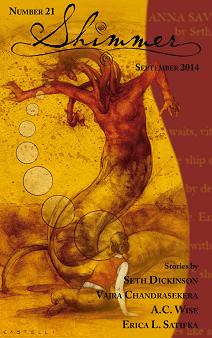Reviewed by Charles Payseur
Anna must weigh lives and outcomes in the face of utter annihilation in Seth Dickinson‘s contemporary science fiction story “Anna Saves Them All.” No stranger to difficult decisions after saving her village from Iraqi soldiers as a child, Anna now works for an American response team in the Middle East which finds an alien craft crashed to Earth. The creature on board, a serpentine alien fleeing a great conquering fleet, needs human brains to stand a chance of fighting against the power that will utterly destroy Earth. Not to prevent Earth’s destruction, though; there is no time for that. It has also poisoned the members of Anna’s team, and Anna must decide what is best, saving her own team or holding to the hope that maybe she could resist, that maybe her planet could win. Her life has taught her, though, that sometimes the best thing to do is save what can be saved regardless of the cost. A powerful story, the parallels between Anna’s past and present are stark and subtle, and her decision never seems odd or overly moralized. The story works, perhaps not as a prescription for what we should all aspire to be or do, but to show the reality of life and decisions in circumstances that are less than ideal.
Two men have a conversation in a rushing tuktuk in “Dharmas,” a weird story by Vajra Chadrasekera. Piter, the driver, and the unnamed passenger debate hell and reality as their vehicle careens through dangerous traffic. A snail is destroyed, a number of accidents take place around them, and the two men eventually come to some sort of an agreement despite holding so different of viewpoints. There are certain things that link them, certain Laws or Dharmas that they cannot escape. Like the ride in the tuktuk, they can only hang on and hope to make it through alive. An interesting bit of writing, the story works as a conversation but slightly less as a story, though I found myself nodding along throughout.
A.C. Wise conjures up a fisherman and his wife who are called by the sea to usher in a new age in the fantasy story “Dream of the Fisherman’s Wife.” Disappointed that they can’t seem to conceive a child together, an answer to their problems takes the form of a strange sea creature that rises and beckons and finally joins the fisherman and his wife in a triad of creation. Though hesitant at first, both humans find themselves more drawn to the bountiful diversity of the water than the desolation of the land. Joining with the creature, they all dive down and pull back up the sea, letting it reclaim the land. Vivid and a bit erotic, the story builds up the relationship between man and woman, sea creature and both of them. It’s striking, though a bit obscure at times in favor of linguistic flourish. Still, it’s a moving story that presents a complex relationship and a satisfying ending.
A man named Gabriel arrives at the site of a failed off-planet colony to realize that it wasn’t quite as failed as he believed in the science fiction story “We Take the Long View” by Erica L. Satifka. The colonists, thought dead because they lost contact with the outside, were actually taken into a collective consciousness with the forest of the world, the Forest-That-Thinks, which gives them a communal telepathy and sustenance but also weakens them and controls them. Gabriel, repulsed but hoping to profit from the discovery, finds one of the colonists willing to leave, and discovers too late that he’s being used in a long game to turn the tables of colonization, where Terra is the target and the Forest-That-Thinks is the soon-to-be empire. Well crafted if not with the most original of premises, the story is entertaining enough. Gabriel, though, comes off as arrogant, ignorant, and slightly predatory, which isn’t really contrasted by the Forest-That-Thinks. It, too, is opportunistic, violent, and cruel, and so I wasn’t really sure what to ultimately walk away from the story feeling. What I did feel was conflicted and lacking a bit of clarity.
Charles Payseur lives with his partner and their growing herd of pets in the icy reaches of Wisconsin, where companionship, books, and craft beer get him through the long winters. His fiction has appeared at Perihelion Science Fiction, Every Day Fiction, and Dragon’s Roost Press.
 Shimmer
Shimmer